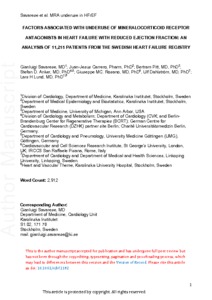Savarese, G; Carrero, J-J; Pitt, B; Anker, SD; Rosano, GMC; Dahlström, U; Lund, LH
(2018)
Factors associated with underuse of mineralocorticoid receptor antagonists in heart failure with reduced ejection fraction: an analysis of 11 215 patients from the Swedish Heart Failure Registry.
Eur J Heart Fail, 20 (9).
pp. 1326-1334.
ISSN 1879-0844
https://doi.org/10.1002/ejhf.1182
SGUL Authors: Rosano, Giuseppe Massimo Claudio
![[img]](https://openaccess.sgul.ac.uk/113822/1.hassmallThumbnailVersion/ejhf1182_am.pdf)  Preview |
|
PDF
Accepted Version
Available under License ["licenses_description_publisher" not defined].
Download (932kB)
| Preview
|
Abstract
AIM: Mineralocorticoid receptor antagonists (MRAs) improve outcomes in heart failure with reduced ejection fraction (HFrEF), but are underutilized. Hyperkalaemia may be one reason, but the underlying reasons for underuse are unknown. The aim of this study was to investigate the independent predictors of MRA underuse in a large and unselected HFrEF cohort. METHODS AND RESULTS: We included patients with HFrEF (ejection fraction <40%), New York Heart Association (NYHA) class II-IV and heart failure (HF) duration ≥6 months from the Swedish HF Registry. Logistic regression analysis identified independent associations between 39 demographic, clinical, co-treatment, and socioeconomic predictors and MRA non-use. Of 11 215 patients, 27% were women; mean age was 75 ± 11 years; only 4443 (40%) patients received MRA. Selected characteristics independently associated with MRA non-use were in descending order of magnitude: lower creatinine clearance (<60 mL/min), no need for diuretics, no cardiac resynchronization therapy/implantable cardioverter-defibrillator, higher blood pressure, no digoxin use, higher ejection fraction, outpatient setting, older age, lower income, ischaemic heart disease, male sex, follow-up in primary vs. specialty care, lower NYHA class, and absence of hypertension diagnosis. Plasma potassium and N-terminal pro B-type natriuretic peptide levels were not associated with MRA non-use. CONCLUSION: Mineralocorticoid receptor antagonists remain underused in HFrEF. Their use does not decrease with elevated potassium but does with impaired renal function, even in the creatinine clearance 30-59.9 mL/min range where MRAs are not contraindicated. MRA underuse may be further related to non-specialist care, milder HF and no use of other HF therapy.
| Item Type: |
Article
|
| Additional Information: |
This is the peer reviewed version of the following article: Savarese, G., Carrero, J.-J., Pitt, B., Anker, S.D., Rosano, G.M., Dahlström, U. and Lund, L.H. (2018), Factors associated with underuse of mineralocorticoid receptor antagonists in heart failure with reduced ejection fraction: an analysis of 11 215 patients from the Swedish Heart Failure Registry. Eur J Heart Fail, 20: 1326-1334, which has been published in final form at https://doi.org/10.1002/ejhf.1182. This article may be used for non-commercial purposes in accordance with Wiley Terms and Conditions for Use of Self-Archived Versions. This article may not be enhanced, enriched or otherwise transformed into a derivative work, without express permission from Wiley or by statutory rights under applicable legislation. Copyright notices must not be removed, obscured or modified. The article must be linked to Wiley’s version of record on Wiley Online Library and any embedding, framing or otherwise making available the article or pages thereof by third parties from platforms, services and websites other than Wiley Online Library must be prohibited. |
| Keywords: |
Guidelines, Heart failure with reduced ejection fraction, Hyperkalaemia, Mineralocorticoid receptor antagonists, Aged, Follow-Up Studies, Heart Failure, Humans, Incidence, Medical Errors, Mineralocorticoid Receptor Antagonists, Prognosis, Registries, Retrospective Studies, Risk Assessment, Risk Factors, Stroke Volume, Survival Rate, Sweden, Humans, Stroke Volume, Prognosis, Registries, Incidence, Survival Rate, Risk Assessment, Risk Factors, Retrospective Studies, Follow-Up Studies, Aged, Medical Errors, Sweden, Heart Failure, Mineralocorticoid Receptor Antagonists, Cardiovascular System & Hematology, 1102 Cardiorespiratory Medicine and Haematology |
| SGUL Research Institute / Research Centre: |
Academic Structure > Molecular and Clinical Sciences Research Institute (MCS) |
| Journal or Publication Title: |
Eur J Heart Fail |
| ISSN: |
1879-0844 |
| Language: |
eng |
| Publisher License: |
Publisher's own licence |
| Projects: |
| Project ID | Funder | Funder ID |
|---|
| 2013-23897-104604-23 | Swedish Research Council | UNSPECIFIED | | 523-2014-2336 | Swedish Research Council | UNSPECIFIED | | 20120321 | Swedish Heart Lung Foundation | UNSPECIFIED | | 20150557 | Swedish Heart Lung Foundation | UNSPECIFIED |
|
| PubMed ID: |
29578280 |
| Dates: |
| Date |
Event |
| 2018-09-05 |
Published |
| 2018-03-26 |
Published Online |
| 2018-02-20 |
Accepted |
|
 |
Go to PubMed abstract |
| URI: |
https://openaccess.sgul.ac.uk/id/eprint/113822 |
| Publisher's version: |
https://doi.org/10.1002/ejhf.1182 |
Statistics
Item downloaded times since 04 Nov 2021.
Actions (login required)
 |
Edit Item |



